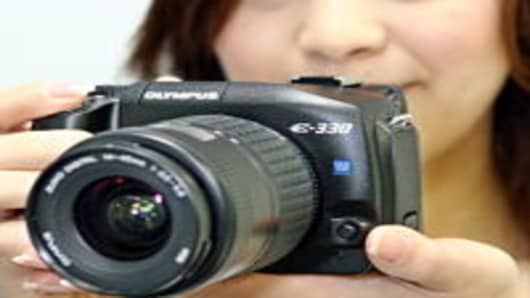But they say they have been thwarted by Olympus's main banks which, in their powerful roles as both major creditors and shareholders, appear to be lining up a company veteran and a senior banker to take over the reins.
The new chairman is expected to be from main lender Sumitomo Mitsui Banking Corp, a unit of Sumitomo Mitsui Financial, the Nikkei newspaper said on Tuesday, adding that executive officer Hiroyuki Sasa would be promoted to president.
SMBC, which is also listed as a major Olympus shareholder alongside a unit of Mitsubishi UFJ Financial, said the bank had no immediate comment.
An Olympus spokesman said no decisions had been reached on its new management line-up.
"We've heard from multiple sources that the banks are trying to push forward with the appointment of a nominally independent board, staffed with affiliated individuals. As far as we're concerned, the Olympus board would then be de-facto creditor-controlled," Josh Shores, principal of Southeastern Asset Management, told Reuters.
"I suspect most non-Japanese investors would reject the idea of a board heavily influenced by Olympus creditors," Shores said, adding that "all options" were being explored to secure the best outcome for his clients and the company.
Another foreign shareholder, New York-based Indus Capital, has also voiced concerns about the new board line-up that seems to be taking shape ahead of a shareholder vote on April 20.
Ethan Devine, partner and portfolio manager at Indus, told Reuters he feared an internal CEO could lack the executive experience to make important strategic decisions, paving the way for the banks to wield even more influence over Olympus.
"This is uncharted territory in some respects since banks in Japan have a long history of helping troubled borrowers manage through crises. But since Olympus has a governance crisis without financial distress, I am not sure it is appropriate for the banks to wield such influence," Devine said.
"When suitors like Sony come calling, a 'green' CEO may look to the chairman for advice. And I have never known a bank to advise a borrower not to raise equity," he said.
Some foreign shareholders are concerned that Olympus creditors could push the company into a big, dilutive sale of new equity, possibly to another Japanese company eager to gain some exposure to its profitable endoscopes business.
Among firms rumored to be interested in making a strategic investment in Olympus are electronics firms Sony and Panasonic , rival endoscope maker Fujifilm and another medical equipment firm, Terumo. South Korea's Samsung Group has also been cited in media speculation as a potential partner.
Olympus controls 70 percent of the global market for diagnostic endoscopes, a business which appears to have held up well since the accounting scandal broke last October, when former Olympus CEO Michael Woodford blew the whistle.
The massive accounting fraud, one of Japan's biggest corporate scandals, was used to hide investment losses off Olympus's book for more than a decade.
On the Outer
Woodford, with the backing of Southeastern and other foreign shareholders, had campaigned to be reinstated as CEO, but he dropped his bid when it became clear major Japanese investors, who own the bulk of Olympus, would not support him.
As the largest foreign owner, Southeastern said it had suggested some high-caliber individuals for board roles, including two Japanese corporate veterans as CEO candidates.
Devine and Shores said Western shareholders had no interest in a power struggle with creditors over the board appointments but wanted qualified, truly independent directors who did not answer to them or any other outside interest.
"Potential strategic partners have a lot to gain from Olympus. I'd like to be sure that the board carefully considers whether such relationships are in Olympus's own long-term best interests," said Devine.
"The real question is whether new management can help the company invest for long-term success. It would be a shame if Olympus were treated like a quasi-bankrupt company and its core technologies fell behind."
The Nikkei said that the likely nominee for Olympus president, Sasa, had worked as head of development as well as marketing at subsidiary Olympus Medical Systems Corp. He would be well placed to turn around Olympus because of his familiarity with the mainstay medical equipment business, it added.
Earlier this month, Japanese police and prosecutors arrested seven men, including former president Tsuyoshi Kikukawa and ex-bankers over the accounting fraud.


